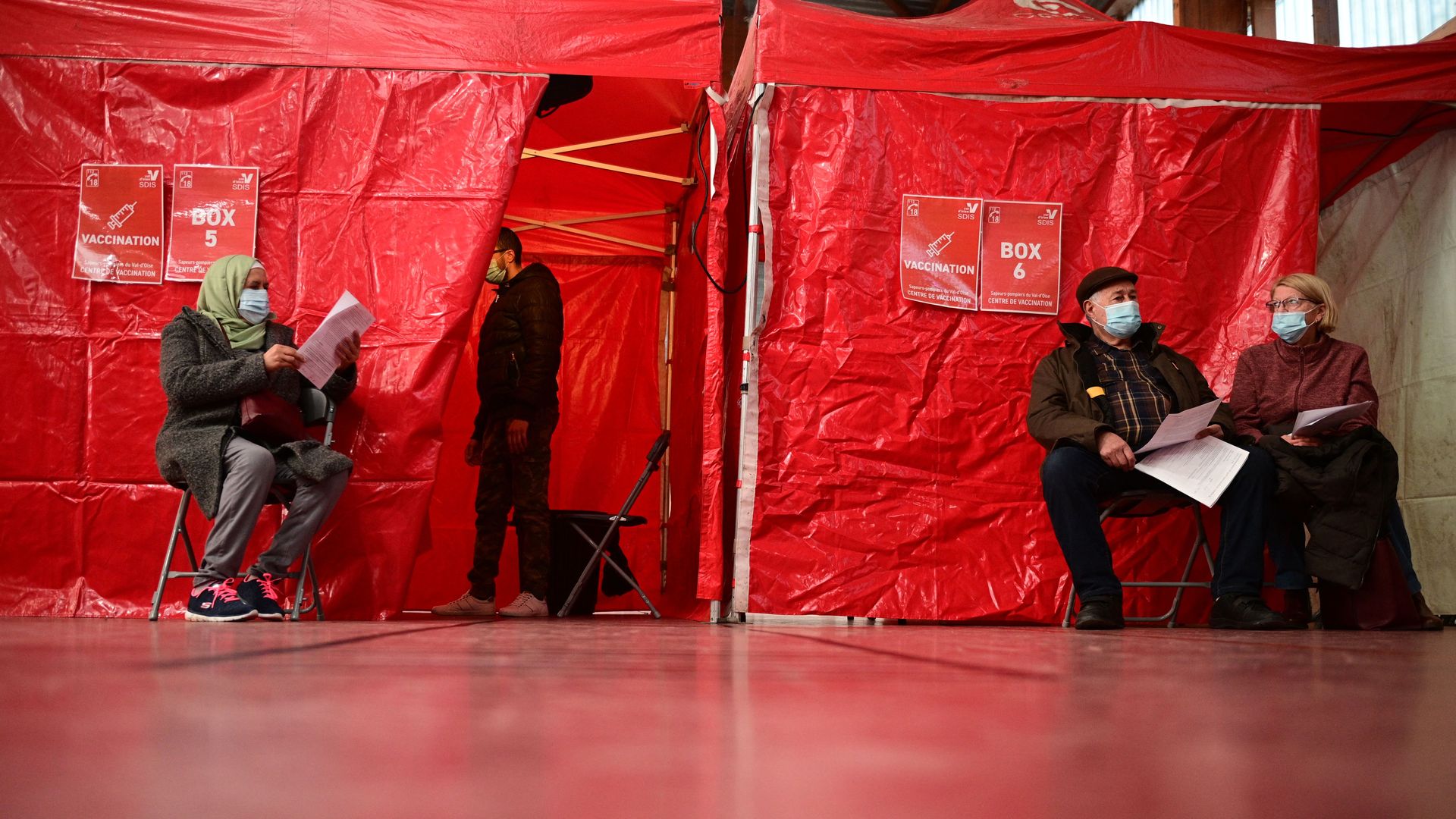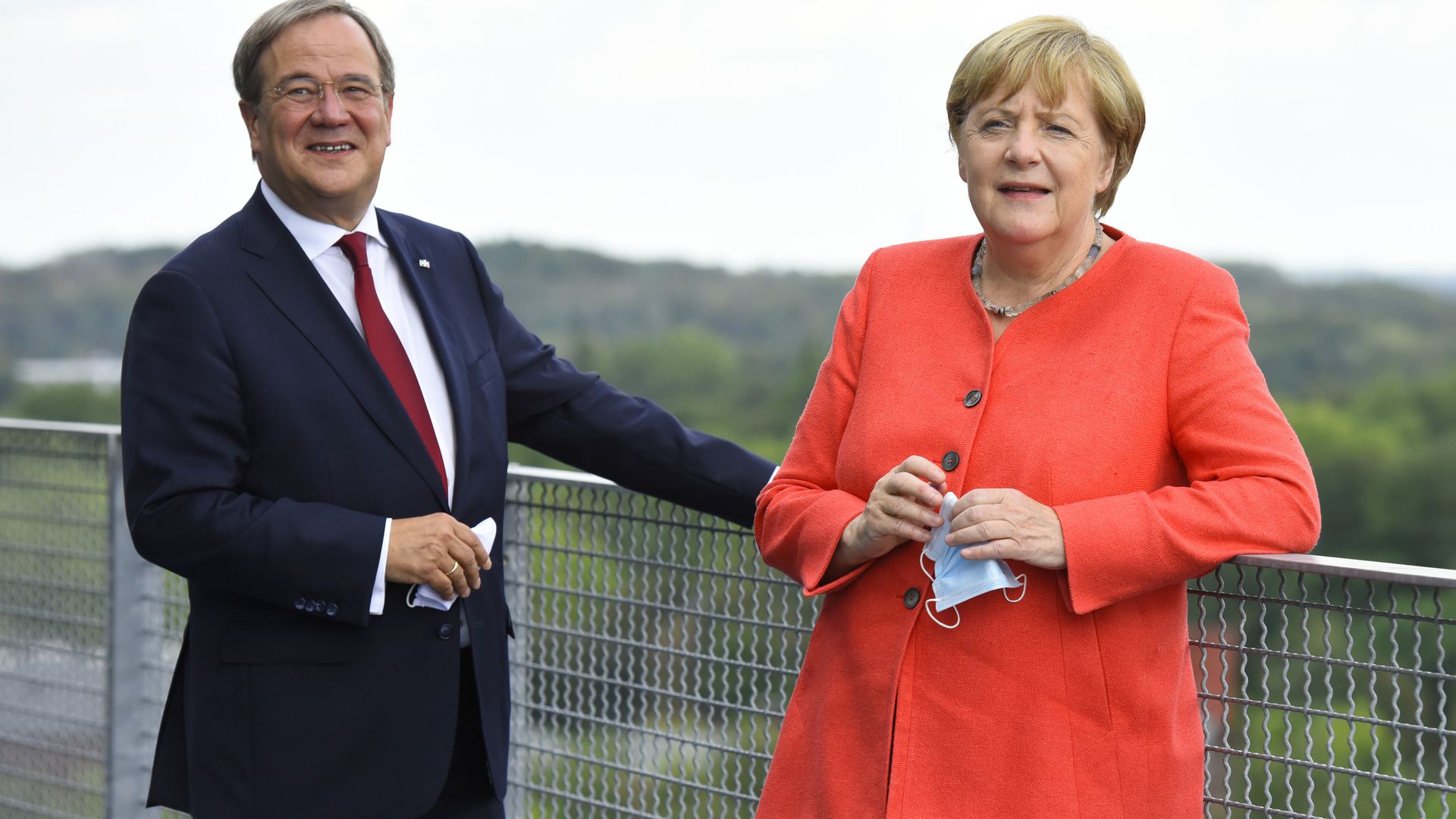| | | | | | | Presented By Babbel | | | | Axios World | | By Dave Lawler ·Mar 15, 2021 | | Welcome back to Axios World. - We begin tonight with some big vaccine news from Europe before checking in on weapons sales and German elections (1,834 words, 6½ minutes).
New arrival? Sign up. | | | | | | 1 big thing: What's happening with AstraZeneca's vaccine? |  | | | Waiting for the vaccine in Cergy, France. Photo: Martin Bureau/AFP via Getty | | | | Use of the Oxford/AstraZeneca vaccine was halted across much of Europe today, including in France, Germany, Italy and Spain. Why it matters: The suspensions followed reports that a small number of patients who received the vaccine experienced blood clots. But public health agencies, including the World Health Organization and the EU's own medical arm, say there's no indication that the blood clots were caused by the vaccine, or that the risks of giving the shot outweigh those of delaying it. - AstraZeneca says that out of the 17 million people who have received the vaccine in the EU and U.K., the number experiencing such symptoms is actually lower than would be expected in the general population.
- Still, safety boards from the WHO and the European Medicines Agency (EMA) will convene on Tuesday to discuss the situation.
- The state of play: The vaccine has been approved by the WHO and some 70 countries. Real-world data from the U.K., where the vaccine has been used most widely, suggests it's highly effective at preventing serious cases. No blood clotting concerns have been reported there.
Driving the news: Denmark and Norway were first to suspend the shot last Thursday, and the EU's most populous countries followed suit today, with leaders describing the suspensions as precautionary. - French President Emmanuel Macron said distribution would be halted for 24 hours pending an EMA assessment.
- Some experts fear such moves risk increasing vaccine hesitancy and further slowing distribution at a dangerous time, given the ongoing vaccine shortages and fast-spreading variants.
- Indonesia cited the situation in Europe today in delaying its rollout, while Canadian Prime Minister Justin Trudeau reassured Canadians that the vaccine was safe, and leaders in the U.K. defended the homegrown jab.
The big picture: This is arguably the most important vaccine in the world in the near term. Around 3 billion doses have been reserved to date, and more than half are destined for developing countries. - The vaccine is relatively affordable (it's not being sold for a profit) and easy to transport and store compared to the Pfizer and Moderna shots.
- The COVAX initiative is sending AstraZeneca doses all over the world, often to countries that have no other source of vaccines.
Yes, but: The rollout of the vaccine in Europe has been plagued by confusion, distrust and even animosity. - AstraZeneca has delivered only half the doses it promised the EU, leading to anger and in one case an export ban.
- The doses that have arrived have been administered remarkably slowly due to hesitancy among the public — fueled in part by skeptical rhetoric from politicians like Macron — and delays in granting approval for people over 65.
In the U.S., which ordered 300 million doses, the vaccine has still yet to be approved. - AstraZeneca's U.S. trial was paused for seven weeks last fall. Concerns about the company's trials intensified after it emerged that some British participants had been mistakenly given a half-strength dose (surprisingly, they had better results).
- The trial data is now at last being reviewed by independent monitors, and emergency authorization could come in about a month, National Institutes of Health Director Francis Collins told Reuters today.
- Collins said he wasn't concerned about the reports of blood clots, adding, "There may be a bit of an overreaction to something that is unrelated to the vaccine itself."
For now, tens of millions of doses are sitting at a facility in Ohio, the NY Times reports. - The White House has rejected requests to send them abroad — including, reportedly, from the European Union.
|     | | | | | | 2. Vaccines vs. variants: A warning from Europe |  Data: Our World in Data; Chart: Axios Visuals A surge in coronavirus infections in Europe makes clear the stakes of the race between vaccines and new variants. Why it matters: Europe and North America, two of the regions hit hardest by the pandemic, both saw sharp declines in cases and deaths beginning in January. Then, Europe's decline gave way to a new spike. America's already slowing decline could slip into reverse next. Stephen Kissler, a researcher at Harvard who models the spread of COVID-19, says the U.S. is "lagging a couple of weeks behind many of the countries in Europe that are starting to see rises in cases right now." - "I think we should take that as a very serious warning that that can and very well might happen here as well," Kissler says.
- The lesson from Europe is "it's possible for these variants to cause surges in Covid during a time of year when you might not expect it," he adds.
- Yes, but: The increasing rate of vaccination in the U.S. and the arrival of warmer weather both work to America's advantage, Kissler says.
What's happening: Europe's latest wave has been particularly destructive in Central European countries like the Czech Republic and Poland, but cases are now rising sharply in Italy and beginning to tick up in France and elsewhere in Western Europe. - Hans Kluge, the World Health Organization's regional director for Europe, cites two factors: variants, particularly the one discovered in the U.K., and premature reopenings.
- The U.K. variant is now dominant in at least eight EU countries, per AP, including France, Germany and Italy. The variant is far more contagious and also appears to be more deadly.
|     | | | | | | 3. State of the outbreak |  | | | Illustration: Annelise Capossela/Axios | | | | 1. As the "South African variant" was becoming a cause for concern all over the world, it was unsurprisingly driving a sharp spike in cases in South Africa, beginning in early December. - But then, suddenly, cases started to fall again in mid-January without a strict lockdown.
- The big picture: India experienced a similar unexplained decline last fall. In both cases, experts have cited a likely rise in immunity in the population, but there's no clear answer yet, per the WSJ.
2. The state investment fund behind Russia's Sputnik V says it has deals to produce the vaccine in multiple EU countries, including Italy, if the vaccine is approved by the EU. - While concerns over transparency remain, trial data suggests the vaccine is highly effective.
- Why it matters: Approval to manufacture the vaccine in Europe would be a major coup for Moscow after years of relative diplomatic isolation. It would also provide an opportunity to increase the relatively sluggish production of the vaccine.
3. China says foreigners arriving in the country via Hong Kong will face a simpler visa application process if they've received a Chinese vaccine, as opposed to a Western one, per the NYT. - That will have little practical effect for now with borders effectively sealed shut. The same is true of China's plans for vaccine passports.
4. The leaders of Australia, India, Japan and the U.S. announced a plan to boost Asia's vaccine supply during a summit of the "Quad" on Friday. - Indian companies will produce U.S.-developed vaccines, including the Johnson & Johnson jab, with funding from the U.S. and Japan.
- Australia will provide logistical support to ensure delivery of the vaccines to Pacific islands and Southeast Asia.
Correction: I erroneously named South Korea as a member of the Quad in Thursday's newsletter. I apologize for the error. |     | | | | | | A message from Babbel | | How Babbel trains your brain to learn a new language | | |  | | | | Unlike other apps that use machine learning to teach you languages, Babbel takes a human-based approach. What this means: Lessons are built by over 150 linguists and prepare you for situations you'll actually encounter in real-life. No random words or abstract grammar. Sign up and get 50% off. | | | | | | 4. Asia news roundup |  | | | A funeral procession for Ye Swe Oo, a protester killed during Myanmar's protests. Photo: STR/AFP via Getty | | | | 1. At least 38 protesters in Myanmar were killed on Sunday, the deadliest day since the Feb. 1 military coup. - Much of the violence took place in a poor suburb of Yangon. Arsonists torched Chinese garment factories there, leading to an angry response from the Chinese Embassy, which said Chinese workers had been injured.
- Between the lines: Anti-Chinese sentiment is riding high among the protesters, who believe Beijing is tacitly backing the military junta.
2. 64 countries joined a statement on Friday at the UN Human Rights Council defending China's policies in Xinjiang, where the Communist Party is carrying out an apparent genocide. - That's up from the 45 who signed a similar statement last year. Cuba, which authored the statement on behalf of China, has not released the list of signatories.
- Meanwhile in the same session, a U.S. diplomat accused China of "crimes against humanity and genocide."
3. Sri Lanka on Saturday announced plans to ban burqas and other face coverings in public, citing national security concerns. - That has deepened concerns about Islamophobia in the country, which has a large Muslim minority, following terror attacks in 2019.
4. Pakistani pop star Meesha Shafi faces potential jail time on defamation charges after accusing a fellow artist of groping her. - "There have been very few #MeToo accusations in Pakistan, a deeply conservative society," the WSJ reports.
- "By many measures, Pakistan ranks as one of the toughest places in the world to be a woman."
5. Secretary of State Tony Blinken and Secretary of Defense Lloyd Austin are in Seoul today on their first foreign tour since taking office. They'll stop in Tokyo next. |     | | | | | | 5. Data du jour: Who's buying weapons |  The U.S. accounted for 37% of all global arms exports over the last five years, with Saudi Arabia — easily the world's top arms buyer — accounting for one-quarter of those sales, according to new data from the Stockholm International Peace Research Institute. By the numbers: U.S. arms exports rose by 15% from 2011-2015 to 2016-2020, with 96 countries buying arms from America. Russia remained the second-largest exporter with 20% of the market, but supplied a smaller pool of 44 countries and saw sales fall by 22% from the previous five years due primarily to a decrease in sales to India. - The next largest arms exporters were France (8% of the total), Germany (5%) and China (5%). China's sales also slid by 8% in the past five years, while exports from Europe increased significantly.
- Israel and South Korea both accounted for about 3% of the total after significantly increasing their exports over the past five years.
Zoom in: Russia had four major clients that accounted for two-thirds of all exports — India, China, Algeria and Egypt — while Pakistan was by far China's biggest client. - The U.S. had a diversified pool of major buyers: Saudi Arabia, Australia, South Korea, Japan, the UAE, Qatar, Israel and the U.K.
The big picture: Arms imports overall were flat between 2011–2015 and 2016–2020, but rose in the Middle East (+25%) while falling in the Americas (-43%), Africa (-13%), and Asia and Oceania (-8.3%). |     | | | | | | 6. One to watch: Merkel's tricky exit |  | | | Merkel and Laschet. Photo: Hauter-Pool/Getty Images | | | | Germany's ruling Christian Democratic Union (CDU) suffered embarrassing defeats in two regional elections on Sunday, casting doubt on the party's chances of retaining power after Chancellor Angela Merkel steps down later this year. Why it matters: The defeats also damage new CDU leader Armin Laschet's chances of representing the German center-right in September's general elections. - Even after winning the party's leadership in January, Laschet could be passed over in favor of the leader of the CDU's Bavarian sister party, Markus Söder, when it comes time to pick a nominee for chancellor.
- Laschet attributed the defeats to voters' concerns about the government's management of the pandemic amid a slow vaccine rollout and rising cases.
The state of play: The CDU is still likely to be the largest party after September's elections, and may lead a coalition with the increasingly popular Greens. - But there's growing speculation about a "traffic light" coalition (so named because of the parties' colors) between the Greens, Social Democrats and Free Democrats, which would exclude the CDU after 16 years of Merkel.
What to watch: The next round of regional elections will come in June. |     | | | | | | 7. Stories we're watching |  | | | Cherry blossom season in Wuhan. Photo: Zhang Qiao/VCG via Getty | | | - Asma al-Assad faces Syrian war crimes investigation
- Ebola outbreak in Guinea may be linked to 2014 epidemic
- U.K. police criticized for response to vigil for murdered woman
- U.S. to resume aid to Yemen as famine looms
- U.S. grants Myanmar nationals temporary protected status
- Oil prices fully rebound a year after shock
- Cricket streaming is Disney+'s secret weapon
Quoted: "We are witnessing the last vestiges of what has been known as the Arab-Israeli conflict." |     | | | | | | A message from Babbel | | How to learn a new language in three weeks | | |  | | | | 73% of Babbel users said they could have a simple conversation in their new language after just 5 hours of lessons. The reason: The language app makes it easy with bite-sized lessons, so you can spend less than 15 minutes a day learning language skills you'll remember. Sign up today and get 50% off. | | | | | | Axios thanks our partners for supporting our newsletters.
Sponsorship has no influence on editorial content. Axios, 3100 Clarendon Blvd, Suite 1300, Arlington VA 22201 | | | You received this email because you signed up for newsletters from Axios.
Change your preferences or unsubscribe here. | | | Was this email forwarded to you?
Sign up now to get Axios in your inbox. | | | | Follow Axios on social media:    | | | | | |
Post a Comment
0Comments